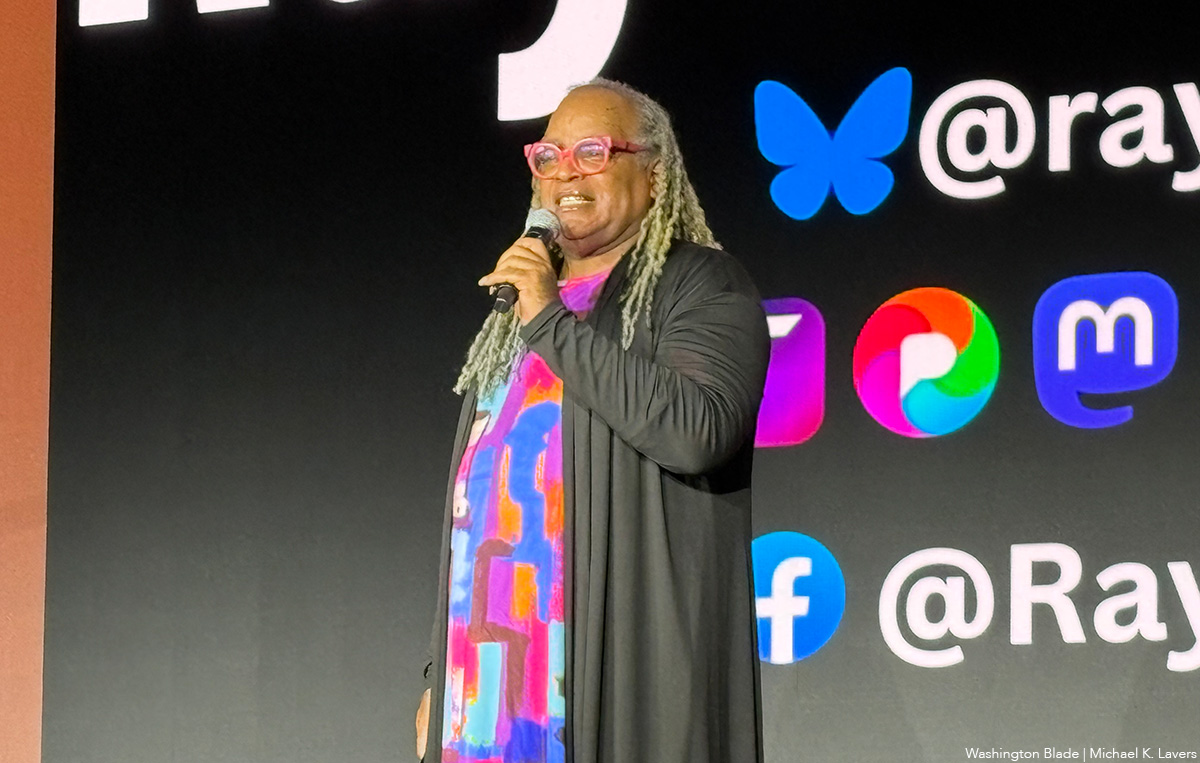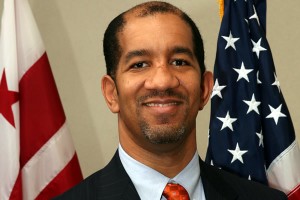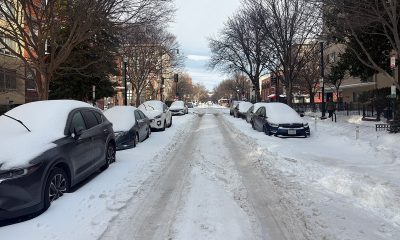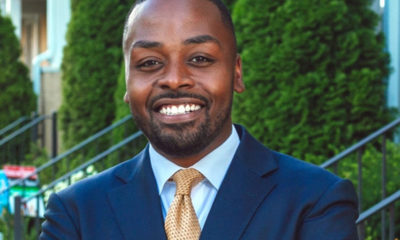Local
Biddle beats out Vincent Orange for interim post
Ward 4 school board member Sekou Biddle, who won an interim appointment to the D.C. City Council last week, says he’s a strong supporter of LGBT rights, including same-sex marriage.
Biddle, 39, beat former City Council member Vincent Orange (D-Ward 5) and four other Democratic candidates who competed for the interim appointment before the 80-member D.C. Democratic State Committee, which makes interim Counsel appointments.
“I support same-sex marriage,” Biddle told the Blade after the vote. “I think it’s an indication of the kind of city that we have. It’s what makes us, in my opinion, a top-flight, world-class city that we have that level of respect for human and civil rights.”
Biddle will face off against Orange and other candidates expected to enter the race from all political parties in a special citywide election scheduled for April 26.
He was expected to take office immediately in his temporary Council appointment for a seat made vacant after Council member Kwame Brown (D-At-Large) won election as City Council Chairman.
Before getting elected to the school board, Biddle began his career as a classroom teacher for eight years. He later served in leadership positions in education advocacy organizations, including his current post as executive director of the group Jumpstart.
Last week’s vote by the State Committee came after each of the candidates spoke before the committee and an overflowing crowd that gathered in a meeting room at the Democratic National Committee headquarters on Capitol Hill.
The Gertrude Stein Democratic Club, the city’s largest LGBT political group, endorsed Biddle in his race for the school board, where he has served since 2007.
Three Stein Club members who also are members of the D.C. Democratic State Committee endorsed and campaigned for Biddle in his quest for the committee’s appointment. The three are Jeffrey Richardson, the Stein Club president; Lateefah Williams, the club’s vice president for legislation and political affairs; and Alexandra Beninda, the club treasurer.
He also received the endorsement of Brown, who beat Orange in the hotly contested race in November for the Council chair race. At least three other Council members – Mary Cheh (D-Ward 3), Harry Thomas (D-Ward 5), and Marion Barry (D-Ward 8) also endorsed Biddle.
Mayor Vincent Gray remained neutral in the contest but some of his top political operatives backed Biddle. This prompted many political observers to conclude that the city’s political establishment had shifted its support from Orange – who was considered the frontrunner just two weeks ago – to Biddle.
Orange came out strongly against same-sex marriage during his unsuccessful race for mayor in 2006. When he ran against Brown for the Council chair seat last year he announced he had changed his position to support the city’s same-sex marriage law. But he was less clear about whether he would support or oppose holding a voter initiative seeking to overturn the marriage equality law, which took effect last March.
It took three rounds of voting for Biddle to nail down his victory over Orange Thursday night. With 74 of the 80 State Committee members present to vote, Biddle won on the third round by a vote of 40 to 31. Three ballots cast by committee members were disqualified because they voted for one of the other candidates that were eliminated after the first round of voting.
Only Biddle, Orange and candidate Stanley Mayes, a Ward 1 political activist, received any votes in the six-candidate race.
Many of the observers at the State Committee meeting were looking toward gay Council member David Catania (I-At-Large) as a possible predictor of what might happen in the April special election.
Catania stunned the city’s political establishment in 1997 when, running as a Republican, he defeated Democratic frontrunner Arrington Dixon in a special election to win his at-large Council seat.
Just 7 percent of the city’s registered voters turned out for the special election. But gays and Republican voters turned out in force, giving Catania his margin of victory over Dixon, a former City Council chairman who some observers said was overly complacent in his campaign.
Catania won re-election to a full term the following year and has retained his seat since that time. He withdrew from the Republican Party in 2004 to become an independent after the GOP and President George W. Bush embraced a constitutional amendment to ban same-sex marriage.
Some local political pundits say pro-gay Republican Patrick Mara, who won election in November to the school board from Ward 1, could be the next “Catania” in the April special election. With a low voter turnout and support from Republicans and gays, among other groups, Mara supporters say he has a shot at winning. He has yet to announce whether he plans to run, although insiders believe he will enter the race.
Catania unofficially backed Mara when Mara ran against and defeated former Republican Council member Carol Schwartz two years ago in the Republican primary. Mara lost the general election to Democrat turned independent Michael Brown in the general election. As a friend of Mara’s, some observers are wondering if Catania will throw his support and political organization behind Mara, with the possibility of Mara coming out ahead if Biddle and Orange split the Democratic vote.
Some gays, including David Mariner, executive director of the D.C. LGBT community center, backed Orange in last year’s council chair race, saying Orange has come around to support LGBT issues and was more qualified as an attorney and accountant to address the city’s budget and economic development issues. Mariner said he has yet to decide whom to support in the April special election.
Ben Young, a spokesperson for Catania, said Catania has no comment at the present time on the upcoming Council special election and the potential candidates that might run in the race.
Richardson of the Stein Club said the comparison between Catania and Mara would not likely apply in this year’s special election because Biddle is expected to run a vigorous campaign and line up support from large numbers of gay voters.
Like Biddle, Mara supports same-sex marriage and has expressed strong support for all other LGBT-related issues.
Biddle told the Blade that his political ties to the LGBT community are strong.
“In terms of politics and endorsements, I got my start in the LGBT community,” he said. “When I ran in 2007 for the Board of Education, the Stein Club was the first one to endorse me, and that gave my candidacy a lot of momentum and visibility. I’ve built a solid relationship since I’ve been in office and I think a level of trust.”
He said he considers himself a “progressive” on a wide range of city issues and hopes to draw support from all sections of the city.
Virginia
McPike wins special election for Va. House of Delegates
Gay Alexandria City Council member becomes 8th LGBTQ member of legislature

Gay Alexandria City Council member Kirk McPike emerged as the decisive winner in a Feb. 10 special election for a seat in the Virginia House of Delegates representing Alexandria.
McPike, a Democrat, received 81.5 percent of the vote in his race against Republican Mason Butler, according to the local publication ALX Now.
He first won election to the Alexandria Council in 2021. He will be filling the House of Delegates seat being vacated by Del. Elizabeth Bennett-Parker (D-Alexandria), who won in another Feb. 10 special election for the Virginia State Senate seat being vacated by gay Sen. Adam Ebbin (D-Alexandria).
Ebbin is resigning from his Senate next week to take a position with Virginia Gov. Abigail Spanberger’s administration.
Upon taking his 5th District seat in the House of Delegate, McPike will become the eighth out LGBTQ member of the Virginia General Assembly. Among those he will be joining is Sen. Danica Roem (D-Manassas), who became the Virginia Legislature’s first transgender member when she won election to the House of Delegates in 2017 before being elected to the Senate in 2023.
“I look forward to continuing to work to address our housing crisis, the challenge of climate change, and the damaging impacts of the Trump administration on the immigrant families, LGBTQ+ Virginians, and federal employees who call Alexandria home,” McPike said in a statement after winning the Democratic nomination for the seat in a special primary held on Jan. 20.
McPike, a longtime LGBTQ rights advocate, has served for the past 13 years as chief of staff for gay U.S. Rep. Mark Takano (D-Calif.) and has remained in that position during his tenure on the Alexandria Council. He said he will resign from that position before taking office in the House of Delegates.
Local
Local LGBTQ groups, activists to commemorate Black History Month
Rayceen Pendarvis to moderate Dupont Underground panel on Sunday

LGBTQ groups in D.C. and elsewhere plan to use Black History Month as an opportunity to commemorate and celebrate Black lives and experiences.
Team Rayceen Productions has no specific events planned, but co-founder Rayceen Pendarvis will attend many functions around D.C. this month.
Pendarvis, a longtime voice in the LGBTQ community in D.C. moderated a panel at Dupont Underground on Feb. 8. The event, “Every (Body) Wants to Be a Showgirl,” will feature art from Black burlesque artists from around the country. Pendarvis on Feb. 23 will attend the showing of multimedia play at the Lincoln Theatre that commemorates the life of James Baldwin.
Equality Virginia plans to prioritize Black voices through a weekly online series, and community-based story telling. The online digital series will center Black LGBTQ voices, specifically trailblazers and activists, and contemporary Black queer and transgender people.
Narissa Rahaman, Equality Virginia’s executive director, stressed the importance of the Black queer community to the overall Pride movement, and said “Equality Virginia is proud to center those voices in our work this month and beyond.”
The Capital Pride Alliance, which hosts Pride events in D.C., has an alliance with the Center for Black Equity, which brings Black Pride to D.C. over Memorial Day weekend. The National LGBTQ Task Force has no specific Black History Month events planned, but plans to participate in online collaborations.
Cathy Renna, the Task Force’s director of communications, told the Washington Blade the organization remains committed to uplifting Black voices. “Our priority is keeping this at the forefront everyday,” she said.
The D.C. LGBTQ+ Community Center is also hosting a series of Black History Month events.
The D.C. Public Library earlier this year launched “Freedom and Resistance,” an exhibition that celebrates Black History Month and Martin Luther King Jr. It will remain on display until the middle of March at the Martin Luther King Jr. Memorial Library at 901 G St., N.W.
District of Columbia
U.S. Attorney’s Office drops hate crime charge in anti-gay assault
Case remains under investigation and ‘further charges’ could come

D.C. police announced on Feb. 9 that they had arrested two days earlier on Feb. 7 a Germantown, Md., man on a charge of simple assault with a hate crime designation after the man allegedly assaulted a gay man at 14th and Q Streets, N.W., while using “homophobic slurs.”
But D.C. Superior Court records show that prosecutors with the Office of the U.S. Attorney for D.C., which prosecutes D.C. violent crime cases, charged the arrested man only with simple assault without a hate crime designation.
In response to a request by the Washington Blade for the reason why the hate crime designation was dropped, a spokesperson for the U.S. Attorney’s office provided this response: “We continue to investigate this matter and make no mistake: should the evidence call for further charges, we will not hesitate to charge them.”
In a statement announcing the arrest in this case, D.C. police stated, “On Saturday, February 7, 2026, at approximately 7:45 p.m. the victim and suspect were in the 1500 block of 14th Street, Northwest. The suspect requested a ‘high five’ from the victim. The victim declined and continued walking,” the statement says.
“The suspect assaulted the victim and used homophobic slurs,” the police statement continues. “The suspect was apprehended by responding officers.”
It adds that 26-year-old Dean Edmundson of Germantown, Md. “was arrested and charged with Simple Assault (Hate/Bias).” The statement also adds, “A designation as a hate crime by MPD does not mean that prosecutors will prosecute it as a hate crime.”
Under D.C.’s Bias Related Crime Act of 1989, penalties for crimes motivated by prejudice against individuals based on race, religion, sexual orientation, gender identity, disability, and homelessness can be enhanced by a court upon conviction by one and a half times greater than the penalty of the underlying crime.
Prosecutors in the past both in D.C. and other states have said they sometimes decide not to include a hate crime designation in assault cases if they don’t think the evidence is sufficient to obtain a conviction by a jury. In some instances, prosecutors have said they were concerned that a skeptical jury might decide to find a defendant not guilty of the underlying assault charge if they did not believe a motive of hate was involved.
A more detailed arrest affidavit filed by D.C. police in Superior Court appears to support the charge of a hate crime designation.
“The victim stated that they refused to High-Five Defendant Edmondson, which, upon that happening, Defendant Edmondson started walking behind both the victim and witness, calling the victim, “bald, ugly, and gay,” the arrest affidavit states.
“The victim stated that upon being called that, Defendant Edmundson pushed the victim with both hands, shoving them, causing the victim to feel the force of the push,” the affidavit continues. “The victim stated that they felt offended and that they were also gay,” it says.
-

 Virginia3 days ago
Virginia3 days agoMcPike wins special election for Va. House of Delegates
-

 New York5 days ago
New York5 days agoPride flag removed from Stonewall Monument as Trump targets LGBTQ landmarks
-

 Florida5 days ago
Florida5 days agoDisney’s Gay Days ‘has not been canceled’ despite political challenges
-

 Philippines4 days ago
Philippines4 days agoPhilippines Supreme Court rules same-sex couples can co-own property



















